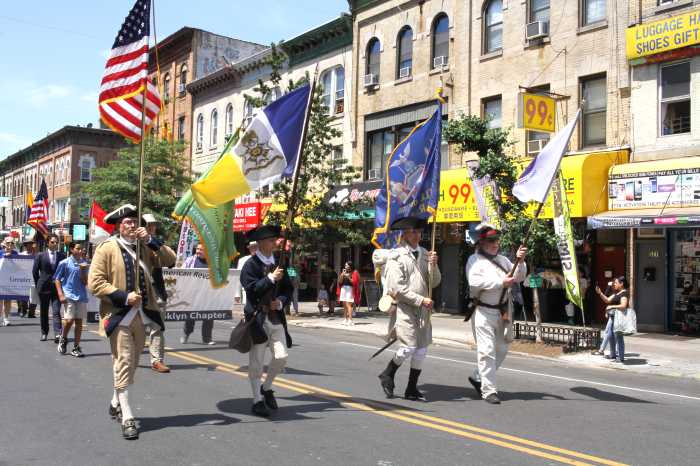In today’s political climate, it is easy for right-wingers to be angry and snide. The public is constantly warmed of liberal outrages and examples of overreaching political correctness. The latest attack on liberalism is the claim that public television is biased and must be made fair and balanced, by adding right-wing programs.
Too often we doesn’t press the advantage when the other side goes too far. Very little anger was expressed when the Saudi Arabian leader, Crown Prince Abdullah, enjoyed a long and friendly visit with Pres. George W. Bush at his Texas ranch. Oil prices were the main topic. The prince is a swell fellow, the president seemed to say. The prince understands that forcing the U.S. into a recession makes Americans buy less gasoline, causing the Saudis to make less money.
The meeting of the two heads of state was so cozy that they walked hand in hand, a “traditional Saudi sign of friendship.” Besides oil, they discussed the Palestinian-Israeli negotiations and Bush’s “call for more democracy in the Middle East,” reported The New York Times.
Saudi Arabia doesn’t quite fit the picture of a true friend of the United States.
This past March, as is their habit, Saudi Security forces raided a party in Jeddah, arresting 110 men for attending a gay wedding. The Manchester Guardian noted that local news reports said the men were dancing and “behaving like women.” The harsh Saudi laws leave the men with only one defense—deny they are gay and deny that a gay wedding was taking place. The event may in fact have been a birthday party.
Amnesty International warned that the 35 men convicted would be tortured. Their sentence is horrifying. Two of the men may die because they will be flogged a total of 2,000 times during their two-year imprisonment; 33 men jailed for one year will be whipped 200 times. Moreover, to avoid any confusion about the government’s policy, the other arrested men were called back to court and given one-year prison terms. The words strong enough to denounce such injustice elude me.
How tragic that a Google search found no daily newspaper in the United States that reported this story. Where’s the fairness and balance in that?
The press, with the honorable exception of the Manchester Guardian, has said little. Ten years ago, the nation was riveted when Michael Fay, an American teenager in Malaysia, who painted graffiti on parked cars and threw rotten eggs, was sentenced to four months in jail and six lashes from a wooden cane. For those who think corporal punishment works, Fay was subsequently arrested in Florida for smoking marijuana.
Six lashes was a case for international titillation, but 2,000 bring no comment. In “Regarding the Pain of Others,” Susan Sontag asked, “What does it mean to protest suffering, as distinct from acknowledging it?”
That is an essential question for those interested in positive social change. It is the very dilemma facing the Iraqi peace movement as the U.S. occupation enters its third year. The protests have gone underground, and the left has lost the power to influence even the Democrats. The prospect that elected officials will be forced to make hard decisions is bleak indeed.
In the case of Saudi Arabia, we can let the government know our objections. Scott Long of the Lesbian, Gay, Bisexual and Transgender Rights Project at Human Rights Watch stresses that “it is a human rights issue.” Saudi Arabia has signed a number of treaties concerning human rights and is obligated to honor these even if it outlaws homosexuality. Long also believes that having members of Congress intervene can be helpful. The Saudi government is “very secretive” and “very resistant” to outside pressure, but there might be some response if “Congress people make it clear that this is a human rights issue.” Pressure from influential American officials could help.
Ariel Herrera, an official with OUTfront at Amnesty International USA, said, “Saudi Arabia is one of about a dozen countries and jurisdictions in the world where punishment for consensual homosexual relations includes the death penalty. The men who were tried and convicted in closed court and with no access to legal representation are typical of a judicial process in Saudi Arabia that falls far short of international standards.”
Amnesty International has pressed the Saudi interior ministry to commute the flogging sentences. As of May 3, the Saudi government had failed to respond.
Long said that the Saudi government faces a “serious fundamentalist insurgency” and seeks to prove its “fundamentalist credentials.” Cases like this one “crop up repeatedly” in Saudi Arabia. Homosexuals are apparently scapegoats to solve other problems faced by Saudi rulers.
The LGBT community should not stand by and allow governments seeking to solve domestic political problems by torturing men believed to be gay.
The sentences imposed on these men for attending a party are torture. Let us not be silent about the suffering these men may endure. Give the Saudi officials a piece of your mind.
Appeals to the Saudi Arabian government may be sent to:
His Royal Highness Prince Naif bin ‘Abdul ‘Aziz
Minister of the Interior
Ministry of the Interior
P.O. Box 2933, Airport Road
Riyadh 11134, Kingdom of Saudi Arabia
Fax: 011 966 1 403 1185 (It may be difficult to get through, so please keep trying.)
His Excellency Dr. ‘Abdullah bin Muhammad bin Ibrahim Al-Sheikh
Minister of Justice
Ministry of Justice
University Street
Riyadh 11137, Kingdom of Saudi Arabia
Fax: 011 966 1 401 1741
His Royal Highness Prince Saud al-Faisal bin ‘Abdul ‘Aziz Al-Saud
Minister of Foreign Affairs
Ministry of Foreign Affairs
Nasseriya Street
Riyadh 11124, Kingdom of Saudi Arabia
Fax: 011 966 1 403 0159
COPIES TO:
Ambassador Prince Bandar Bin Sultan
Embassy of Saudi Arabia
601 New Hampshire Ave. NW
Washington DC 20037
Fax: 1 202 944 3113
Email: info@saudiembassy.net.
gaycitynews.com
































